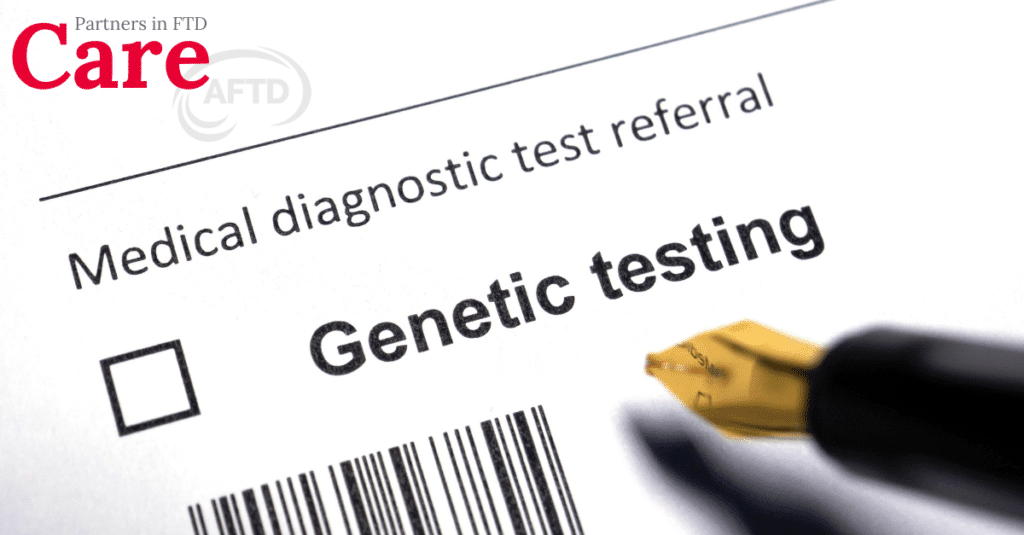What to Know Before Ordering Genetic Testing

Partners in FTD Care, Winter 2022
Download the full issue (pdf)
Frontotemporal degeneration is a progressive, terminal neurological disease with no FDA-approved treatments. Because of the seriousness of the condition and the potential implications for extended family members, particular care and consideration need to be given to the emotional, privacy, and legal/financial needs of the person receiving genetic testing. Asymptomatic family members of persons diagnosed with FTD often feel distressed when discussing both their risk of developing FTD and the idea of undergoing predictive genetic testing (Wong et al., 2021). Genetic counselors can help people to better understand the goals of genetic testing, review their family history, and provide a risk assessment. AFTD recommends those considering genetic testing first be referred to a genetic counselor.
Our understanding of FTD’s causes has grown greatly over the last 20 years. Thirty to fifty percent of cases have a family history of dementia, a major psychiatric condition, or progressive challenges in movement. A subset of these familial cases is genetic, or hereditary, in nature (Goldman & van Deerlin, 2018). FTD is genetically heterogenous, with at least 13 genes being associated with autosomal dominant cases. Most of the heritability is found in three genes: MAPT, GRN, and C9orf72. Because of the chance that FTD can be inherited, many people who have a family member diagnosed with FTD want to learn more about the genetic risk of getting FTD themselves.
Clinicians may recommend genetic testing in the presence of a strong family history or clinical presentations, as in the case of FTD-ALS. Because family history may not be complete or conclusive, all persons diagnosed with FTD should be offered genetic counseling to help get answers and assuage any concerns they or their family might have (Goldman & van Deerlin, 2018). For many people, learning their genetic risk can relieve anxiety resulting from the unknown.
The lack of disease-modifying treatments in FTD can lead to increased stress around testing (Roggenbuck, Quick & Kolb, 2017). However, as potentially disease-modifying treatments in FTD enter clinical trials, people with known genetic variants can participate and advance the science of FTD.
Those considering genetic testing face many complex considerations; their empowerment and emotional well-being should be of the utmost priority. Individuals decide to undergo genetic testing for different reasons; a person’s genetic status can inform their financial future, the decision to raise a family, and long-term care planning. Regardless, the decision to undergo genetic testing is a personal one, and necessary support should be offered.
Sources:
Goldman, JS, & Van Deerlin, VM (2018). Alzheimer’s Disease and Frontotemporal Dementia: The Current State of Genetics and Genetic Testing Since the Advent of Next-Generation Sequencing. Molecular Diagnosis & Therapy, 2018; 22(5), 505–513. https://doi.org/10.1007/s40291-018-0347-7.
Roggenbuck, J, Quick, A, & Kolb, SJ. Genetic Testing and Genetic Counseling for Amyotrophic Lateral Sclerosis: An Update for Clinicians. Genetics in Medicine, 2017; 19(3), 267-274.
Wong, B, et al. Knowledge Assessment and Psychological Impact of Genetic Counseling in People at Risk for Familial FTD. Alzheimer’s & Dementia, 2021; 13(1): e12225.
See also:
- Does It Run in the Family?: The Genetics of FTD
- The Role of Genetics in FTD: An Overview
- Providing Support to Those Considering Genetic Testing: Guidance for Healthcare Professionals
- From a Caregiver’s Perspective: Deciding to Learn One’s Genetic Status
- What to Do About…The Decision to Learn One’s Genetic FTD Status
- Download the full issue (pdf)
By Category
Our Newsletters
Stay Informed
Sign up now and stay on top of the latest with our newsletter, event alerts, and more…
